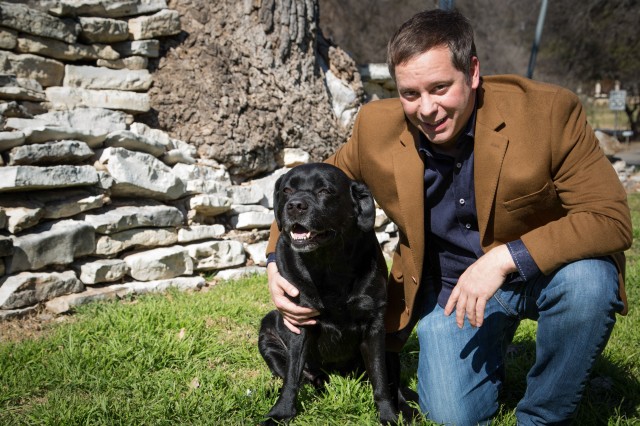Austin Natural Pet Food Company Moves to Become a National Brand

Nulo CEO Michael Landa, with his dog Max outside the company’s offices, is aiming for the premium pet food company to become a national brand this year. Photo by Martin do Nascimento.
By Joseph Baucum
Reporting Texas
In less than four years, Austin-based Nulo has grown from premium pet food startup to a regional brand available at Texas Whole Foods Markets and some other retailers.
Now the company is aiming to make a bigger mark in the $20 billion pet food industry with a new distribution deal that could put it on the shelves of 3,600 pet stores nationwide.
“The goal is to be a national brand, and we expect the number of physical locations to increase by tenfold in very short order,” said Michael Landa, Nulo’s founder and CEO, in an interview at the company’s offices in West Lake Hills.
Max, his big English Labrador retriever, lounged in a corner, along with Betty, a yellow Lab owned by Clayton Christopher, a Nulo investor and board member who founded Sweet Leaf Tea in Austin.
Landa said one of the country’s largest independent pet food distributors will begin handling Nulo in April. He declined to name the company. Nulo is exiting the grocery stores that had carried its products, including Whole Foods.
“They were a good partner for us,” said Liz Burkhardt, a spokesperson for the Austin-based natural foods grocer, which has carried Nulo in Texas and a few stores in other states. The decision to end the relationship was Nulo’s, she said.
Nulo also has stopped selling directly to customers online, instead partnering with pet specialty sites such as Chewy.com.
“It will improve our cost structure and operating efficiencies,” Landa said. “Ultimately, it allows us to expand and {provide} support more quickly.”
The privately held company doesn’t disclose financial reports, but Landa said he expects Nulo to grow substantially this year.
Landa started the company in late 2010 after noticing a rising number of diabetic and overweight dogs at The Pet Staff, his Los Angeles pet care company. The Pet Staff conducted an independent study of 6,500 households to find out what owners were feeding their pets, and concluded that poor nutrition was the key factor.
Nulo’s dog and cat foods are made from natural ingredients such as free-range turkey, lamb and wild-caught salmon, and have none of the meat byproducts, fillers or artificial preservatives or coloring found in mass-market brands. They contain low-glycemic carbohydrates, which help prevent diabetes. Landa said the recipes are based on recommendations and advice from animal nutritionists. The 14-employee company uses a Kansas company to manufacture its products.
Eighty percent of the pet food industry is dominated by five companies according to Landa. Some of the biggest companies include Mars Inc., Nestlé Purina PetCare, Colgate-Palmolive, Procter & Gamble and Del Monte Foods, according to industry publications.
While sales are stagnating for the big mass-market brands, they are growing in the premium and natural food category, according to market research company Package Facts. So is the competition: Even Walmart has its own natural brand.
The sales trend could mean more sales for independent stores, which carry premium brands not sold in grocery stories or by chains such as Petco and PetSmart.
Tomlinson’s, an Austin pet specialty chain with eight stores, carries only natural and premium brands such as Nulo and Orijen, a Canadian brand that Landa said is Nulo’s closest competitor.
“The best selling dog food brands nationally will be the big guys like Beneful, Kibbles ’n Bits, and those made by companies like Nestlé,” said Kate Click, Tomlinson’s head of marketing and community outreach. “These are popular foods, but they don’t meet our nutritional criteria, so we don’t sell them. We pay closer attention to our own customers’ requests.”
Those customers are willing to pay more for natural brands: Nulo retails for about $60 for a 28-pound bag, compared to about $35 for a 32-pound bag of Purina.
Grain-free pet foods are the most popular at this moment, Click said. Nulo is adding two new grain-free lines in April, Landa said.
Deborah Besch, a veterinarian at Austin Vet Hospital, said she thinks dogs and cats thrive best on food with protein from actual meat, not byproducts such as beaks, talons and feathers that are used in many cheaper foods.
“Feathers are pure protein,” said Besch, who has been a veterinarian for 32 years. “So you can have feathers in the food, and you will have a high level of protein. That doesn’t mean it’s good protein for the animal.”
Besch does not think all mass-market brands are low quality.
“People like to say bad things about Purina and Hill’s because ‘They have corn in them and corn is bad,’” she said. Besch said she has’t seen research that indicates corn is bad for most dogs.
Landa said customers concerned about healthy living are a prime demographic for Nulo, citing Austin and its fitness-focused residents as an example.
“People here have a ‘get-it’ factor when it comes to pet foods that are healthy and fresh,” he said.
With expanded distribution, Nulo aims to attract more customers like David and Sara Fridlund, who recently adopted Nina, a 3-year-old Chihuahua-dachshund mix. David Fridlund said they are considering Nulo.
“You have to read up,” said Fridlund, an assistant manager at Next to New, a nonprofit resale shop on Burnet Road. “If you get a dog or a cat, it’s your responsibility to make sure they’re healthy. For us, we can’t afford for Nina to be sick, so we need to make sure that she eats the best food that we can get.”